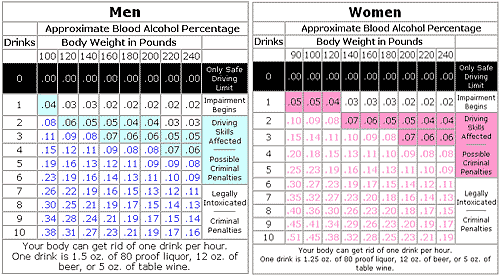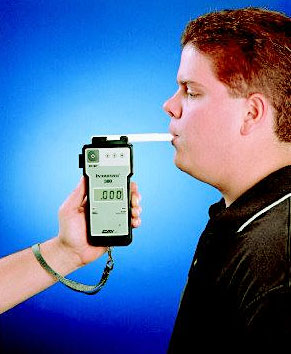Alcohol Testing
Alcohol testing has come a long way in recent
years. In fact, manufacturers now sell home alcohol test kits
or wheels for use at home, parties or other activities where one
wishes not to drive afterwards, but not be over the Blood-Alcohol
Concentration (BAC) limit. Employers, schools and others are also
requiring alcohol tests as a condition for retention. Those who
have been pulled over for suspected DUI know well that alcohol
testing is required by the police officer at the time you are
stopped.
Blood Alcohol Guide

For purposes of this guide, "one drink" is equal
to 1.5 oz. of 80 proof liquor, 12 oz. of regular beer, or
5 oz. of table wine. Your results may vary since many factors
such as age, gender, physical condition, amount of food consumed
and any drugs or medication may influence these results. The
best advice is to abstain. Data supplied by the Pennsylvania
Liquor Control Board.
Employer Alcohol Tests
Many employers require alcohol testing as a part of the pre-employment
screening process. The employer will generally pay for such
testing and may refuse to hire an individual based on the
test results. As of January, 1996, employers who have drivers
on their workforce (with Commercial Drivers Licenses) such
as school bus drivers must have an effective alcohol testing
program in place. Employers must conduct alcohol testing that
is random, under reasonable suspicion, as part of return to
duty, follow-up and when an accident has occurred.
School Alcohol Testing
School alcohol testing at school events is becoming more
popular. Many teachers have dreaded chaperoning dances only
to deal with several trips to the hospital for alcohol poisoning
with their underage students. Many schools are now testing
students who enter school dances, including proms, with Breathalyzers.
Others say that testing kids as they leave events is the way
to go since this will ensure that they are not leaving the
school and driving drunk.
Some schools have expanded their alcohol testing policy to other
events such as night football games as well. Critics say that
instead of spot-checking kids as a way of punishment it would
be better to deter kids with advanced warning of the alcohol testing
instead.

Breathalyzer
DUI Alcohol Tests
DUI (or Driving Under the Influence) alcohol testing is usually
administered by a police officer using breathalyzer equipment
and/or a series of field sobriety tests developed by the National
Highway Traffic Safety Administration (NHTSA). Some of the
basic field sobriety tests include Alcohol Gaze Nystagmus
test, standing on one foot, walking imaginary line, finger
counting and alternate clapping.
In some states a driver can choose a blood test or a urine
test in lieu of the breathalyzer test. One of the newer machines
is a "datamaster" which is much less complicated
to use than a breathalyzer. The "datamaster" prints
out a ticket with your mechanically determined breath test
results, and no interpretation is required.
For most states, having a BAC of .08 or above (.10 in some
states) is the threshold for being declared legal drunk.
Alcohol Testing Kits
Besides the breathalyzer, datamaster, blood and urine screening
methods used by trained professionals, there are also home kits
one can purchase in hopes of helping oneself, family or friends
avoid a DUI ticket or a lifelong problem. Some of the kits include
alcohol saliva kits, drink wheel calculators, urine kits, personal
digital breathalyzers, hand-held pupillometer and many others.
Alcohol testing is here to stay. Since alcohol-related deaths
account for 85,000 to 100,000 people annually in the U. S. alone,
this type of testing has become part of our day-to-day culture.
Those who have alcohol dependency problems or are heavy drinkers
should seek immediate help and not use alcohol kits as a means
to avoid getting the needed help. When used correctly, to help
oneself, one's family, friends or coworkers, alcohol checks can
help save lives and this makes it a truly valuable asset in our
culture.
|


